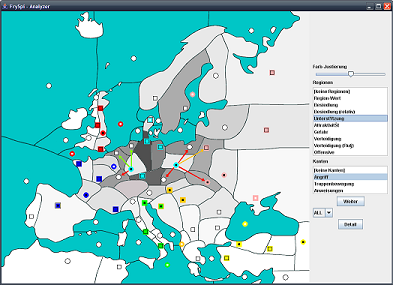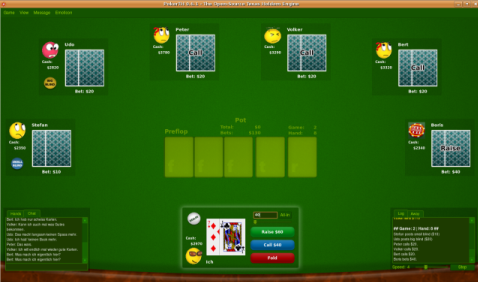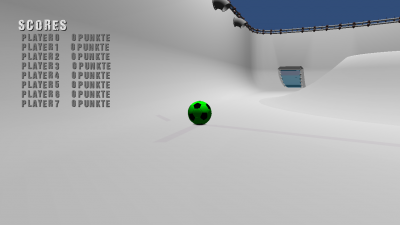CI in Games
Current Activities
- CIG 2014 is hosted in Dortmund
- Results of the StarCraft AI competition at CIG 2012
- EvoGames 2012 2nd Call for Papers EvoGames is part of evo* 2012
- DETA @ GECCO 2012: Call for Papers Digital Entertainment and Arts track
- Online talk about StarCraft bots by Johan Hagelbäck on October 6, 2011 in our DDH Seminar, see recording here or on YouTube
- Results of the 10-bot StarCraft AI competition tournament at CIG 2011 now online.
- Mike Preuss is co-organizer of the StarCraft AI competition at CIG 2011.
- Mike Preuss is co-organizer of the StarCraft AI competition at CIG 2010.
- Car setup optimization competition at EvoStar 2010: Unranked organizers entry by Markus Kemmerling remarkably good.
- TORCS competition at CEC 2009: Mr. Racer wins on Corkscrew Track.
Members
Publications
Journal Articles
- Jan Quadflieg, Mike Preuss, Günter Rudolph. Driving as a human: a track learning based adaptable architecture for a car racing controller. In: Genetic Programming and Evolvable Machines, Volume 15, Issue 4, pp. 433-476. 2014.
- Santiago Ontanon, Gabriel Synnaeve, Alberto Uriarte, Florian Richoux, David Churchill, Mike Preuss. A Survey of Real-Time Strategy Game AI Research and Competition in StarCraft. In: IEEE Transactions on Computational Intelligence and AI in Games, Volume 5, Issue 4, pp. 293-311. 2013.
- Julian Togelius, Mike Preuss, Nicola Beume, Simon Wessing, Johan Hagelbäck, Georgios N. Yannakakis, and Corrado Grappiolo. Controllable procedural map generation via multiobjective evolution. In: Genetic Programming and Evolvable Machines, Volume 14, Issue 2. 2013.
- Mike Preuss, Nicola Beume, Holger Danielsiek, Tobias Hein, Boris Naujoks, Nico Piatkowski, Raphael Stüer, Andreas Thom, Simon Wessing. Towards Intelligent Team Composition and Maneuvering in Realtime Strategy Games. IEEE Transactions on Computational Intelligence and AI in Games, Volume 2, Issue 2, pp. 82-96. 2010.
- Daniele Loiacono, Pier Luca Lanzi, Julian Togelius, Enrique Onieva, David A. Pelta, Martin V. Butz, Thies D. Lönneker, Luigi Cardamone, Diego Perez, Yago Saez, Mike Preuss, Jan Quadflieg. The 2009 Simulated Car Racing Championship. IEEE Transactions on Computational Intelligence and AI in Games, Volume 2, Issue 2, pp. 131-147. 2010.
Conference Articles (peer reviewed)
- Kevin Majchrzak, Jan Quadflieg, Günter Rudolph. Advanced Dynamic Scripting for Fighting Game AI. In: Entertainment Computing - ICEC 2015, Springer LNCS 9353, pp. 86-99.
- Jan Quadflieg, Mike Preuss and Günter Rudolph. How costly is a good Compromise: Multi-objective TORCS controller parameter optimization. In: Proceedings of the IEEE 2015 Conference on Computational Intelligence and Games. 2015.
- Paolo Burelli, Mike Preuss. Automatic Virtual Cinematography: a Dynamic Multi-Objective Optimisation Perspective. In EvoApplications 2014, Springer.
- Mike Preuss, Antonios Liapis and Julian Togelius. Searching for Good and Diverse Game Levels. In: Proceedings of the IEEE 2014 Conference on Computational Intelligence and Games. 2014.
- Jan Quadflieg. Improvements for the simulated car racing software interface. In: Proceedings of the IEEE 2014 Conference on Computational Intelligence and Games. 2014. (Demonstration Paper).
- Matthias Kuchem, Mike Preuss and Günter Rudolph. Multi-Objective Assessment of Pre-Optimized Build Orders exempli ed for StarCraft 2. In Computational Intelligence in Games (CIG) 2013, IEEE.
- Mike Preuss, Daniel Kozakowski, Johan Hagelbäck, Heike Trautmann. Reactive Strategy Choice in StarCraft by Means of Fuzzy Control. In Computational Intelligence in Games (CIG) 2013, IEEE.
- Annika Jordan, Dimitri Scheftelowitsch, Jan Lahni, Jannic Hartwecker, Matthias Kuchem, Mirko Walter-Huber, Nils Vortmeier, Tim Delbrügger, Ümit Güler, Igor Vatolkin, Mike Preuss BeatTheBeat music-based procedural content generation in a mobile game. In CIG 2012, pp. 320-327. IEEE, 2012
- Mike Preuss, Tobias Wagner, David Ginsbourger. On the Use of Kriging for Modeling High-Dimensional Noisy Observations of Computer Games. In Proceedings of the LION6 conference, Lecture Notes in Computer Science, pp. 145-159. 2012.
- Mike Preuss, Paolo Burelli, Georgios N. Yannakakis. Diversified Virtual Camera Composition. In EvoApplications 2012, pp. 265-274. Springer, 2012
- Mike Preuss, Jan Quadflieg, Günter Rudolph. TORCS Sensor Noise Removal and Multi-objective Track Selection for Driving Style Adaptation. In: Proceedings of the IEEE 2011 Conference on Computational Intelligence and Games, pp. 337-344. 2011.
- Philip Hingston, Mike Preuss. Red teaming with coevolution. In: IEEE Congress on Evolutionary Computation, pp. 1155-1163, 2011.
- Jan Quadflieg, Mike Preuss, Günter Rudolph. Driving Faster Than a Human Player. In: Proceedings of Evostar 2011 , pp. 143-152. 2011.
- Markus Kemmerling, Niels Ackermann und Mike Preuss. Nested Look-Ahead Evolutionary Algorithm Based Planning for a Believable Diplomacy Bot. In EvoApplications (1), Lecture Notes in Computer Science, Volume 6624, pp. 83-92, Springer, 2011.
- Julian Togelius, Mike Preuss, Nicola Beume, Simon Wessing, Johan Hagelbäck, and Georgios N. Yannakakis. Multiobjective Exploration of the StarCraft Map Space. IEEE Conference On Computational Intelligence and Games (CIG), IEEE press, 2010.
- Markus Kemmerling and Mike Preuss. Automatic Adaptation to Generated Content Via Car Setup Optimization in TORCS. IEEE Conference On Computational Intelligence and Games (CIG), IEEE press, 2010.
- Jan Quadflieg, Mike Preuss, Oliver Kramer and Günter Rudolph. Learning the Track and Planning Ahead in a Car Racing Controller. IEEE Conference On Computational Intelligence and Games (CIG), IEEE press, 2010.
- Philip Hingston, Mike Preuss, and Daniel Spierling. RedTNet: A Network Model for Strategy Games. Proc. of the 2010 IEEE Conference on Evolutionary Computation (CEC), part of 2010 IEEE World Congress on Computational Intelligence (WCCI 2010), IEEE Press, 2010.
- Julian Togelius, Mike Preuss and Georgios N. Yannakakis, Towards multiobjective procedural map generation, Proceedings of the ACM Foundations of Digital Games, ACM Press, 2010.
- Markus Kemmerling, Niels Ackermann, Nicola Beume, Mike Preuss, Sebastian Uellenbeck, Wolfgang Walz. Is Human-like and Well Playing Contradictory for Diplomacy Bots?, Proc. of the IEEE Symposium on Computational Intelligence and Games (CIG 2009), p. 209-216, IEEE Press, 2009.
- Holger Danielsiek, Raphael Stüer, Andreas Thom, Nicola Beume, Boris Naujoks, Mike Preuss. Intelligent Moving of Groups in Real-Time Strategy Games. Proc. of the IEEE Symposium on Computational Intelligence and Games (CIG 2008), p. 71-78. IEEE Press, 2008.
- Nicola Beume, Tobias Hein, Boris Naujoks, Nico Piatkowski, Mike Preuss, Simon Wessing. Intelligent Anti-Grouping in Real-Time Strategy Games. Proc. of the IEEE Symposium on Computational Intelligence and Games (CIG 2008), p. 63-70. IEEE Press, 2008.
- Nicola Beume, Tobias Hein, Boris Naujoks, Georg Neugebauer, Nico Piatkowski, Mike Preuss, Raphael Stüer, Andreas Thom. To Model or Not to Model: Controlling Pac-Man Ghosts Without Incorporating Global Knowledge. Proc. of the 2008 IEEE Congress on Evolutionary Computation (CEC 2008), pp. 3463-3470. IEEE Press, 2008.
- Nicola Beume, Holger Danielsiek, Christian Eichhorn, Boris Naujoks, Mike Preuss, Klaus Stiller, Simon Wessing. Measuring Flow as Concept for Detecting Game Fun in the Pac-Man Game. Proc. of the 2008 IEEE Congress on Evolutionary Computation (CEC 2008), pp. 3447-3454. IEEE Press, 2008.
Technical Reports
- Mike Preuss, Nicola Beume, Holger Danielsiek, Tobias Hein, Boris Naujoks, Nico Piatkowski, Raphael Stüer, Andreas Thom, Simon Wessing. Intelligent Group Movement and Selection in Realtime Strategy Games. Reihe CI 255/08, SFB 531, Technische Universität Dortmund, 2008.
- Holger Danielsiek, Christian Eichhorn, Tobias Hein, Edina Kurtić, Georg Neugebauer, Nico Piatkowski, Jan Quadflieg, Sebastian Schnelker, Raphael Stüer, Andreas Thom, Simon Wessing. PG511 - CI in Games - Final Report. Reihe CI 252/08, SFB 531, Technische Universität Dortmund, 2008.
- Holger Danielsiek, Christian Eichhorn, Tobias Hein, Edina Kurtić, Georg Neugebauer, Nico Piatkowski, Michael Puchowezki, Jan Quadflieg, Sebastian Schnelker, Raphael Stüer, Andreas Thom, Simon Wessing. PG511 - CI in Games - Zwischenbericht. Reihe CI 236/07, SFB 531, Technische Universität Dortmund, 2007.
Demonstration Articles
- Nicola Beume, Boris Naujoks, Georg Neugebauer, Nico Piatkowski, Mike Preuss. Supporting the Player by Means of Intelligent Group Behavior in Realtime Strategy Games. Demonstration Paper. Workshop within 10th International Conference on Parallel Problem Solving From Nature (PPSN 2008), 2008.
- Niels Ackermann, Alireza Gholaman, Matthias Grochowski, Marc Gorzala, Markus Kemmerling, Daniel Spierling, Thomas Harweg, Sebastian Uellenbeck, Wolfgang Walz. Emotionally affected poker players. Demonstration Paper. Workshop within 10th International Conference on Parallel Problem Solving From Nature (PPSN 2008), 2008.
- Nicola Beume, Boris Naujoks, Georg Neugebauer, Nico Piatkowski, Mike Preuss. CI enlivened ghosts for Pac-Man. Demonstration Paper. Workshop within 10th International Conference on Parallel Problem Solving From Nature (PPSN 2008), 2008.
Teaching
Completed Project Groups
- PG 511: CI in games - Methoden der Computational Intelligence zur Entwicklung von Spielstrategien. SoSe 2007 - WiSe 2007/08
Advisors: Beume, Naujoks, Preuß. - PG 529: Spielercharaktere mit CI - Modellierung menschenähnlicher Gegenspieler in Strategiespielen mit Techniken der Computational Intelligence. SoSe 2008 - WiSe 2008/09
Advisors: Beume, Naujoks, Preuß. - PG 554: Mobile Musik-Welten – Spielerische Exploration von digitalen Musiksammlungen. SoSe 2011 - WiSe 2011/12
Advisors: Vatolkin, Preuß.
Current Project Group
- PG 596: Spielende kooperierende Agenten. WiSe 2015/16 - SoSe 2016
Advisors: Quadflieg, Eichhorn, Hildebrand.
Current Diploma Theses
None
Completed Diploma Theses
- Daniel Spierling: Adative Automated red Teaming ny Means of Computational Intelligence. August 2010.
Advisors: Rudolph, Hingston (Australia). - Markus Kemmerling: Optimierung der Fahrzeugabstimmung auf Basis verrauschter Daten einer Autorennsimulation. July 2010.
Advisors: Rudolph, Preuß. - Niels Ackermann: Evolutionäre Spielbaumsuche für das Strategiespiel Diplomacy. May 2010.
Advisors: Rudolph, Preuß. - Jan Quadflieg: Lernende und planende Steuerungen für eine Autorennsimulation. February 2010.
Advisors: Rudolph, Preuß. - Daniel Haus: Ein Konzept zur Unterstützung menschlicher Spieler in Browsergames. July 2009.
Advisors: Rudolph, Preuß. - René Goebels: Methoden der Computational Intelligence zur Gegnermodellierung beim Pokerspiel. October 2008.
Advisors: Rudolph, Beume. - André Briskorn: Neuronales Selbstlernen von strategischen Spielen. September 2006.
Advisors: Rudolph, Jansen.
Current Master Theses
- Kevin Majchrzak: Entwicklung einer Erklärungskomponente für das beobachtete Verhalten von Agenten in Videospielen.
Advisors: Rudolph, Volz.
Completed Master Theses
- Matthias Kuchem: Reaktive Pareto-Optimale Eröffnungsstrategien in Echtzeitstrategiespielen. April 2014.
Advisors: Rudolph, Preuß.
Current Bachelor Theses
- Yannick Poggel: Ein parametrisierbarer Agent zur Skalierung der Spielgüte im MarioAI Benchmark.
Advisors: Rudolph, Volz. - Hendrik Hollenborg: Analyse menschlicher Reaktionen auf Fortbewegungsarten bei virtueller Realität.
Advisors: Rudolph, Volz.
Completed Bachelor Theses
- Marvin Böcker: Optimale Parametrisierung von hybriden Agenten für General Video Game Playing.
Advisors: Rudolph, Volz. - Kai Franke: Gravitationsfreie 3D-Navigation in prozedural generierten Höhlensystemen.
Advisors: Rudolph, Volz. - Norman Marks: Messbarkeit der Schwierigkeitskurven von generierten Platformer-Leveln.
Advisors: Rudolph, Volz. - Henrik Holtkamp: Identifikation und Analyse verschiedener ausgeglichener Einheitenkonfigurationen im Kontext eines einfachen Echtzeitstrategiespiels.
Advisors: Rudolph, Preuß. - Tobias Klöppner: Computergegner für das Brettspiel Abalone basierend auf Monte Carlo Tree Search.
Advisors: Rudolph, Quadflieg. - Sebastian Schroer: Automatisches Balancing von Computergegnern im Videospiel SuperAzurit64.
Advisors: Rudolph, Volz. - Christian Römer: Künstliche Intelligenz für ein Brettspiel mit vollständiger Information.
Advisors: Rudolph, Quadflieg. - Ansgar-Philip Szameitat: Entwicklung und Validierung eines Bewertungskonzepts zur Analyse des Balancing in StarCraft.
Advisors: Rudolph, Volz. - Steffen Biehs: Robustes Lenkverhalten für die Autorennsimulation TORCS.
Advisors: Rudolph, Quadflieg. - Vinzenz Johna: Eine adaptive Gegner-KI für prozedural generierte Plattformer-Level.
Advisors: Rudolph, Preuß. - Mark Ostendorf: Ein Konzept zum Balancing eines Jump 'n' Run-Spiels durch KI-Spieler.
Advisors: Rudolph, Volz. - Joel Kepya Sandjong: Prozedurale Generierung von Spielfeldern für ein Jump 'n' Run Spiel. September 2015
Advisors: Rudolph, Quadflieg. - Martin Weinert: Kameragestützte Identifikation und Markierung von Bildschirmpositionen durch mobile Endgeräte. September 2015
Advisors: Rudolph, Volz. - Maurice Buchsein: Ein avisuelles Spiel mit haptischem und akustischem Feedback für mobile Endgeräte. July 2015
Advisors: Rudolph, Quadflieg. - Ngoc Duc Nguyen: Ein kooperatives Geschicklichkeitsspiel für mobile Endgeräte. July 2015
Advisors: Rudolph, Volz. - Sven Kubisch: Ein Fuzzy Expertensystem zur Entscheidungsunterstützung in einem Echtzeitspiel. April 2015.
Advisors: Rudolph, Quadflieg. - Annika Nehrke: Optische Erkennung von Schachrätseln aus Rastergrafiken zur Benutzung auf mobilen Endgeräten. March 2015.
Advisors: Rudolph, Volz. - Michel Jakob: Prozedurale Raumschiff-Generierung durch kompetitive Evolution. March 2015.
Advisors: Rudolph, Preuß. - Gertrude Weidner: Ein vertikales Scrolling-Spiel unter Verwendung von Bewegungssensoren auf mobilen Endgeräten. March 2015.
Advisors: Rudolph, Preuß. - Kevin Majchrzak: Adaptives Scripting für Echtzeitspiele. October 2014.
Advisors: Rudolph, Quadflieg. - Fabian Bruckner: Robuste Rennlinienplanung in der Rennsimulation TORCS. May 2014.
Advisors: Rudolph, Quadflieg. - Jan Mühlig: Kontrollierbare Schwarmbewegung von Einheiten in Starcraft. March 2014.
Advisors: Rudolph, Quadflieg. - Janine Hemmers: Prozedurale Generierung von Spielfeldern für ein Tower Defense Duell. March 2014.
Advisors: Rudolph, Quadflieg. - Mika Busch: Optische Erkennung von Sudoku Rätseln aus Rastergrafiken zur Benutzung auf mobilen Endgeräten. January 2014.
Advisors: Rudolph, Quadflieg. - Matthäus Poloczek: Konzeption eines schwarmbasierten Echtzeitspiels und dessen Umsetzung mit libGDX. January 2014.
Advisors: Rudolph, Quadflieg. - David Sturm: Ein Kommunikationsprotokoll für kooperative Agenten in Echtzeitstrategiespielen am beispiel von StarCraft. January 2014.
Advisors: Rudolph, Preuß. - Ersin Özdemir: Computergegner für das Strategiespiel “Triple Triad” auf mobilen Endgeräten. October 2013.
Advisors: Rudolph, Quadflieg. - Kai Verlage: Adaptive Ausweichstrategien für die Autorennsimulation TORCS. September 2013.
Advisors: Rudolph, Quadflieg. - Micheal Pantförder: Realisierung eines Jump 'n' Run Spiels unter Verwendung der Unity3D Game-Engine und des KINECT Sensors. February 2013.
Advisors: Rudolph, Quadflieg. - Jan Winkels: Automatisches Balancing im Echtzeitstrategiespiel Megaglest. June 2013.
Advisors: Rudolph, Preuß. - Marco Kuhnke: Konzeption eines Multiplayer-Ballspiels auf Basis der Game Engine Unity3D. December 2012.
Advisors: Rudolph, Quadflieg. - Daniel Kozakowski: Flexible Strategien für einen Computergegner im Echtzeitstrategiespiel StarCraft. September 2012.
Advisors: Rudolph, Preuß. - Christopher Morris: Ameisenalgorithmen zur Lösung des Logikrätsels Inshinoheya. December 2011.
Advisors: Rudolph, Quadflieg. - Susanna Pohl: Kollisionsvermeidung in einer Autorennsimulation. October 2010.
Advisors: Rudolph, Preuß. - Tim Delbrügger: Modellierung des Lenkverhaltens eines Fahrzeugs in einer Autorennsimulation. September 2010.
Advisors: Rudolph, Preuß. - Jan Czogalla: Ein reaktiver Computergegner für ein Echtzeitstrategiespiel. September 2010.
Advisors: Rudolph, Preuß.
Completed Seminar
- Computational Intelligence bei Computerspielen. SoSe 2007.
Advisor: Rudolph
Project Groups
PG 511
Due to the fact that the Artificial Intelligence (AI) of non-player characters (NPCs) in computer games often features shortfalls, the PG511 tried to improve NPCs' intelligence by means of Computational Intelligence (CI), such as Artificial Neural Nets (ANN) and Evolutionary Algorithms (EA). The hope was that this approach would make their behaviour less predictable. The main task of the PG511 was to figure out whether CI methods could be applied to computer games, how far CI methods can balance a game's difficulty while giving the observer an impression that the NPCs behave in a natural, human-like way. As mentioned above the PG511 had two semesters for developing CI methods for computer games, a Pac-Man clone called NJam and a more complex realtime strategy game (RTS) Glest. For further information you can visit the PG511 homepage .
PG 529
The aim of the PG529 was to enhance gameplay experience by modeling more humanlike non-player characters. During the two semester period the PG529 worked out solutions for two very different games. The first game was the computer game PokerTH which is a computer version of the popular poker variant Texas Hold'em.  In the process of enhancing the game, the project group removed the existing computer opponent and replaced it by an opponent being controlled by an Artificial Neural Net (ANN). The ANN was optimized using an Evolutionary Algorithm (EA) and was able to reproduce the behaviour of human players. Furthermore two new ways of communication were added: Sending predefined text messages and the ability of showing emoticons. The second game was the computer version of the board game Diplomacy. Negotiation is a very important aspect while playing Diplomacy which is why the main target of the PG529 was to improve the non-player characters ability to negotiate and evaluate the relationships between the different players. The group was divided into three sub-groups which developed different bots implementing different strategies independently. The developed bots where compared and a Turing test has been performed.
In the process of enhancing the game, the project group removed the existing computer opponent and replaced it by an opponent being controlled by an Artificial Neural Net (ANN). The ANN was optimized using an Evolutionary Algorithm (EA) and was able to reproduce the behaviour of human players. Furthermore two new ways of communication were added: Sending predefined text messages and the ability of showing emoticons. The second game was the computer version of the board game Diplomacy. Negotiation is a very important aspect while playing Diplomacy which is why the main target of the PG529 was to improve the non-player characters ability to negotiate and evaluate the relationships between the different players. The group was divided into three sub-groups which developed different bots implementing different strategies independently. The developed bots where compared and a Turing test has been performed.
Stragotiator
One of the bots that were first developed within the project group have been taken further and is also available from the web page of Markus Kemmerling. A description of the major features and the planning method that has been added by Niels Ackermann is contained in the EvoGames 2011 paper (EvoApplications 2011: Proceedings, Part I, Springer).
Fachprojekte (technical projects) Digital Entertainment Technologies
Course was run in summer terms 2012, 2013, 2014, 2015 and in winter term 2014/15.
Course plan summer 2012 (in German), linking to some additional material
IBalls game the 3rd of 3 projects, a not-so-trivial multiplayer game for the Unity enginge, see example picture (at startup time). It was developed with help of modern design tools as articy:draft.

